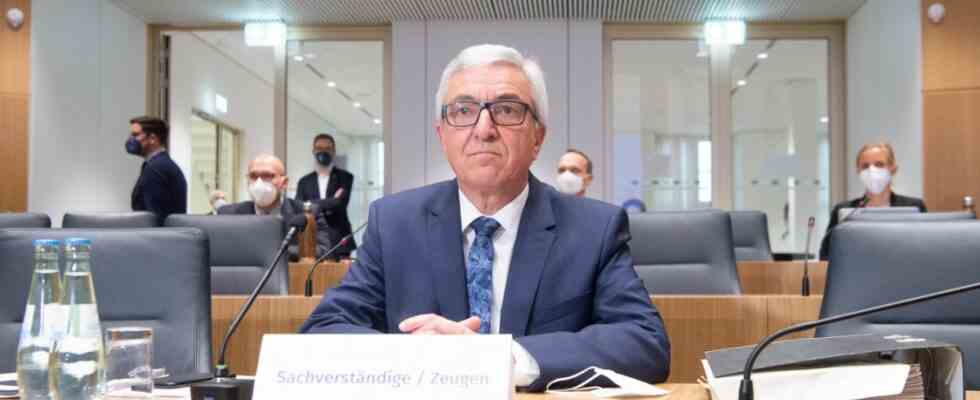At the SPD in Rhineland-Palatinate, the phones are often busy. MPs text that they are in touch, and when they do, they were in “internal rounds”. That there is so much to talk about has to do with police videos released on Tuesday. They show the evening of the flood disaster in the Ahr Valley in July 2021: entire villages are flooded, water slaps against the gables of houses. People have taken refuge on the roofs of garages, they send light signals into the night, and with each light signal, Interior Minister Roger Lewentz (SPD) comes under more pressure. Still under pressure.
What happened?
Roger Lewentz has been criticized for weeks for what he did on the evening of the flood – or rather Not has made. He did not ensure that the country took over civil protection from the counties. He did not ensure that the state government’s crisis team was convened. He didn’t make sure that Prime Minister Malu Dreyer was woken up. Instead, he texted her at 12:58 a.m.: “The situation is escalating (…) there may be / may have been deaths”.
Lewentz defended himself that he had “not had a complete picture of the situation”.
So far he had defended himself by saying that on the evening of the disaster he had “not had a complete picture of the situation”. He had seen police photos, he knew of six collapsed houses in debt. Is not that enough? Criticism of Roger Lewentz increased.
At the end of September, the committee of inquiry met, Lewentz was to testify as a witness in the Mainz state parliament. That day, MPs were shown the police videos. Not public. Lewentz said afterwards that he saw her for the first time. Because it was the situation center in his ministry that asked the police headquarters in Koblenz to send the helicopters out for reconnaissance – but the videos apparently did not reach the ministry. The Koblenz police chief explained this later with a documentation error. The criticism of Lewentz continued to increase.
This week it reached its preliminary peak with the publication of the police videos, but above all with what the Minister of the Interior said about it. He recognizes “a very strong flood”, but “no collapsed houses, no dead, no clogged bridges”. Had he seen the videos on the evening of the flood, he said, it probably wouldn’t have changed anything.
Nothing changed?
This Thursday, the AfD announced that it wanted to hold a vote of no confidence in the interior minister. The CDU has been calling for his resignation for a long time, and the group leader Christian Baldauf called the assessments of the videos “cynical”. If Lewentz does not go, the prime minister must fire him.
“They are a head and an ass”
There are several reasons why Malu Dreyer has not yet done so. One might be that the two have known each other for years. When she moved to the State Chancellery in 2013, he was already Minister of the Interior. “They’re a head and a jerk,” say people who have something to do with both, and mean much more than a party friendship.
Another reason might be the internal logic of the Rhineland-Palatinate SPD. Roger Lewentz is not only a minister, he is also the chairman of the state party. An important post. When Malu Dreyer was re-elected in 2021, the votes had hardly been counted when the first people were already wondering whether she would run again in 2026. And if not, who could succeed her. If Lewentz were to resign now, he would also have to resign as state chairman, and whoever got this post would have a good chance of being the successor. Malu Dreyer may not have decided on that yet.
When the lines are free in the SPD, there is a lot of talk about the unity of the party. Lewentz did not see the videos, the demands of the CDU and AfD were “politically motivated”. It’s not a good time right now, but bad times will pass too. To ask?
But there are also MEPs who answer in more detail. You describe Roger Lewentz as “unusually self-critical”, as a man in a dilemma. If he goes outside with self-criticism, it will be interpreted as a weakness and he will have to resign. On the other hand: If he does not resign, he will burden the government. “I’m ambivalent,” says one, “but I don’t think he can survive it.” The catastrophe was too bad for that.

